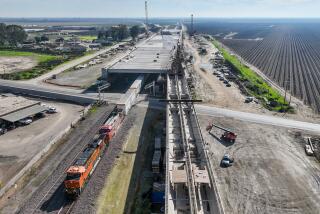Super-Speed Rail Line Slow to Get Untracked : High-tech: At a meeting this week, a two-state panel will try to prod the contractor, Bechtel Corp., into getting up steam on the Anaheim-Las Vegas project.
- Share via
A showdown may occur this week over the lack of progress on a high-speed, magnetic-levitation rail line between Las Vegas and Anaheim.
Scheduled to meet in Ontario on Thursday and Friday, the California-Nevada Super Speed Ground Transportation Commission will consider signing a new memorandum of understanding with San Francisco-based Bechtel Corp., spelling out what Bechtel must do to retain its exclusive franchise to build and operate the $5-billion system.
The super-speed train commission awarded a conditional franchise to Bechtel last year. The train, that could travel at speeds up to 270 m.p.h., is being heavily promoted by the cities of Anaheim and Las Vegas as a way to boost tourism and ease highway congestion.
But last February, company officials announced that their initial goal to finish the line by 1997 had been extended by five years. They cited the sluggish economy, the pullout of Japanese investor C. Itoh, the need by the train’s German engineers to complete a series of reliability tests and the need for Congress to pass several laws, including one that would provide free right of way along Interstate 15.
Under current law, the project is supposed to be built with no public money, except that required to pay administrative costs to operate the commission. Those costs so far have been borne mostly by taxpayers in Anaheim and Las Vegas.
Upset, however, that Bechtel--a big, global engineering and industrial-construction firm--is not using its own vast resources to proceed, Assembly Transportation Committee Chairman Richard Katz (D-Sepulveda) recently began arguing that Bechtel should immediately launch into costly engineering and environmental work.
“I’ve always had a question about Bechtel’s long-term commitment to this project,” Katz said. It was Katz’s legislation that set up the bistate, super-speed train panel. He also is a key commission member and its former chairman.
The super-speed train commission will go out of existence in December unless a bill by Assemblyman Tom Umberg (D-Garden Grove) is approved before then.
Walter Bell, a Bechtel deputy manager overseeing the project, said through a company spokesman that the firm remains committed to a yearlong work plan approved by the train commission in May. That plan is aimed at clearing the remaining technical, legislative and financing hurdles, which are still formidable.
According to Katz’s staff, Bechtel at one point proposed a memorandum of understanding that would obligate the commission to seek legislation exempting the project from some environmental-review requirements. Bechtel officials, however, emphatically denied this and said a proposed memorandum without such provisions is being reviewed by commission members.
But Katz said he and other commissioners have found the document unacceptable. And he complained that he tried several times since January to meet with Bechtel Group president Riley Bechtel but that other corporate officers blocked his efforts.
Meanwhile, Katz said the Umberg legislation contains new rules. If, as some fear, public money or federal financial guarantees must be used to support the $5-billion project, it will be bid again, with the possibility that Bechtel could lose its exclusive franchise, probably to backers of the French TGV, a steel-wheel-on-steel-rail train that has set speed records in France.
Also, Katz said the legislation requires the commission to have a franchisee by the end of 1992. Although Bechtel was selected for the project earlier, the franchise award isn’t final until both legislatures and governors of both states ratify it.
Katz charged that Bechtel has lost interest in the project and is simply looking for a graceful way out. “I think they’re trying to make it look like this commission’s fault. . . . They’re in a posturing mode,” Katz said, “so it can look like they tried and it just didn’t work.”
Orange County Supervisor Don R. Roth, chairman of the super-speed train commission, defended Bechtel’s reluctance to spend more of its own money now without having the project’s total financing in place.
“Katz’s position was that Bechtel should go and start the engineering, get the EIR (environmental impact review),” Roth said. “As far as I’m concerned, that’s fantasyland. They estimate that the EIR alone will cost more than $30 million, with no guarantee that they’ll ever get one cent back on this project.”
A compromise is in the offing, with Bechtel being asked to at least start the environmental-review process, which can be broken down into phases, according to Katz’s staff.
More to Read
Sign up for Essential California
The most important California stories and recommendations in your inbox every morning.
You may occasionally receive promotional content from the Los Angeles Times.













